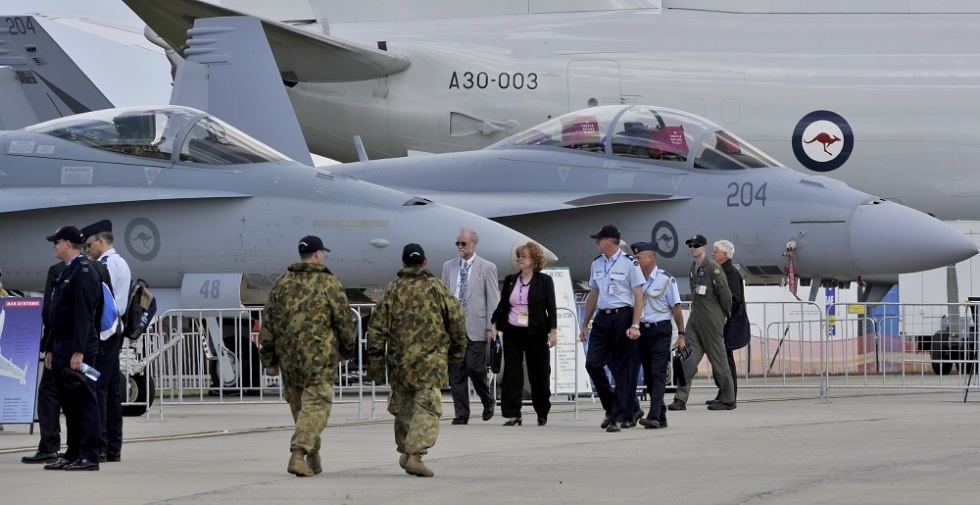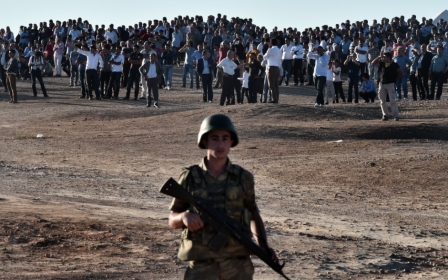Australian and Belgian jets fly first mission against IS in Iraq

Australian fighter jets flew their first armed combat mission in Iraq against the Islamic State group but did not launch air strikes, the military said Monday.
Head of the defence force Air Chief Marshal Mark Binskin said the two Royal Australian Air Force F/A18 combat aircraft had returned safely to base.
"The Super Hornet aircraft conducted an air interdiction and close air support mission over northern Iraq overnight," the Australian Defence Force said in a statement.
"The Super Hornets were on-call to attack targets as identified.
"On this occasion the aircraft did not use their munitions and have returned to base to disarm and prepare for future sorties."
The flights are the first since the Australian government on Friday authorised strikes on Islamic State (IS) militants in Iraq.
Australia is part of the international coalition conducting an air campaign against IS that the United States has been building since first launching air strikes in Iraq in August and in Syria in late September.
Like France, Britain, Denmark, Belgium and the Netherlands, Australia has limited its operations to Iraq. The United States and several Arab coalition partners have been conducting air strikes against IS militants in Syria.
Belgium also on Sunday carried out its first strikes in Iraq, the defence ministry said.
Belgium has contributed six F-16 bombers to the US-led air campaign against IS militants.
Two of the Belgian jets were flying their first reconnaissance missions over Iraqi territory on Sunday when they were called to action.
"After the positive identification of a terrorist element attacking Iraqi security forces", one of the war planes was asked to launch an air strike, the ministry said in a statement.
"The Belgian aircraft intervened with a GPS-guided bomb, resulting in the immediate neutralisation of the enemy threat," it added.
Former chief of the Australian army Peter Leahy meanwhile on Monday justified Australian planes having not carried out a strike, saying it was normal for jets to return from missions without dropping any bombs.
"You would expect something like this to happen, particularly as we want to minimise collateral damage. We don't want to be hitting the wrong target," he told the Australian Broadcasting Corporation.
"What we have seen from [Islamic State] over the last week or so is that they've made themselves a much harder target... they've dispersed, they're adapting camouflage patterns, they've moved back inside the cities and getting close to the forces and holding on."
IS militants have seized swathes of Iraq and Syria, declaring a "caliphate" and imposing a harsh interpretation of Islamic law.
Australian Prime Minister Tony Abbott has spoken strongly against the IS organisation, saying the decision to support international operations is in Australia's national interest.
"The beheadings, the crucifixions, mass executions, ethnic cleansing and sexual slavery that are occurring in northern Iraq and Syria, are only the beginning if [Islamic State] has its way," he said on Saturday.
Australia deployed some 600 troops and several aircraft to the United Arab Emirates in mid-September as it geared up to join the US-led international coalition.
It wants to deploy special forces to Iraq to advise and assist Iraqi forces but is awaiting approval from the Iraqi government.
Australia's involvement in Iraq has the support of both Abbott's conservative coalition and the opposition Labor Party.
"This is a humanitarian mission that is important for the peace and freedom of the people of Iraq and also for global stability and global peace," Labor's Chris Bowen said.
Government Senator Mitch Fifield said Australians would be pleased the first foray had ended safely.
"The mission obviously will have many iterations. This is the first," he told Sky News.
New MEE newsletter: Jerusalem Dispatch
Sign up to get the latest insights and analysis on Israel-Palestine, alongside Turkey Unpacked and other MEE newsletters
Middle East Eye delivers independent and unrivalled coverage and analysis of the Middle East, North Africa and beyond. To learn more about republishing this content and the associated fees, please fill out this form. More about MEE can be found here.



